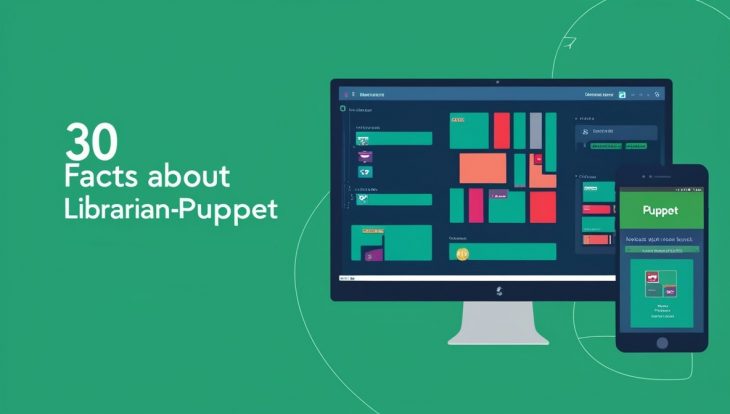
Librarian-puppet is a specialized tool designed to simplify and automate the management of Puppet modules, making dependency handling efficient and straightforward. Comparable to Bundler for Ruby, Librarian-puppet controls module installations, updates, and versioning via a centralized Puppetfile, allowing users to streamline and automate complex configurations. With features like version locking, multiple source support, and integration with tools like Artifactory, it’s highly flexible for diverse environments. Here’s an in-depth look at Librarian-puppet’s functionality and features, showcasing why it’s valued in infrastructure automation and configuration management.
Key Takeaways:
- Efficient Dependency Management: Librarian-puppet automates the resolution and installation of Puppet module dependencies through a central
Puppetfile, ensuring consistency and simplifying updates across environments. - Flexibility and Integration: It supports multiple module sources, including Git and JFrog Artifactory, providing flexibility in management and enhancing integration with existing workflows for infrastructure projects.
Purpose and Core Functionality
Librarian-puppet operates as a robust dependency manager, focusing on efficient Puppet module management through digital automation.
- Dependency Management
Inspired by Bundler for Ruby, Librarian-puppet functions as a dependency manager specifically for Puppet modules, creating a centralized and consistent approach to module handling. - Automated Module Directory Management
It automates the management of themodules/directory, allowing for seamless updates and installations based on specifications. - Central Configuration: The Puppetfile
ThePuppetfileacts as the control center, where users specify and lock down module versions, sources, and dependencies, preventing inconsistency issues. - Version Locking for Stability
By generating aPuppetfile.lock, Librarian-puppet secures module versions, ensuring each environment remains consistent without unexpected version shifts. - Flexible Sourcing Options
Users can source modules from Puppet Forge, Git repositories, or local paths, offering advanced technology flexibility for various environments.
Commands and Usage
With a focus on digital efficiency, Librarian-puppet provides a streamlined set of commands for users to easily manage and monitor module dependencies.
- Installation Command
A simplelibrarian-puppet installcommand fetches and installs every module in thePuppetfile, saving time and reducing manual input. - Updating Modules
The commandlibrarian-puppet update <module_name>provides a quick update process, keeping modules current without editing configuration files directly. - Outdated Module Check
By runninglibrarian-puppet outdated, users can check for obsolete modules, making system updates manageable and ensuring technology revolution readiness. - Temporary Files and
.tmp/Directory
Librarian-puppet temporarily caches data in.tmp/, keeping the system organized and preventing clutter in version-controlled files. - Git Integration
Users can directly fetch modules from Git repositories, which provides data analytics potential for version control and change tracking. - Subdirectory Option for Git
The:path =>option in thePuppetfileallows users to pull modules from specific subdirectories within a Git repository.
Advanced Features and Support
Librarian-puppet’s advanced capabilities accommodate diverse user needs, from error handling to compatibility with data analytics and machine learning frameworks.
- Artifactory Support
From version 5.4.5, Librarian-puppet supports integration with JFrog Artifactory, making it easier to manage modules from corporate repositories. - Open-Source Community
As an open-source project, Librarian-puppet invites contributions, encouraging innovation and rapid adaptability to user demands. - Dependency Resolution Model
Its unique dependency resolution model avoids runtime errors by resolving dependencies once, ensuring stability with each run. - Compatibility with Ruby
Built on Ruby, Librarian-puppet requires a Ruby environment, tapping into Ruby’s ecosystem and data processing systems. - Installation Process
Users can install Librarian-puppet easily usinggem install librarian-puppet, ensuring quick setup for any project. - Command-Line Interface
The command-line interface of Librarian-puppet offers all the flexibility needed for installations, updates, and dependency queries.
Best Practices and Configuration Management
Librarian-puppet aligns with configuration management best practices, enabling version control and seamless integration across systems.
- Module Isolation
Once installed, users should avoid manual modifications within themodules/directory, allowing Librarian-puppet to maintain consistency. - Multi-Source Module Management
Librarian-puppet supports multiple sources in a singlePuppetfile, providing options for diverse sources and data integration. - Error Handling and Feedback
Built-in error handling delivers feedback on issues during module installations, enabling efficient troubleshooting and reduced downtime. - Comprehensive Documentation
Detailed documentation helps users understand the nuances of Librarian-puppet, optimizing the learning curve for smoother integration. - Community Support for Users
An active community and support forums provide real-time help, sharing insights on best practices, updates, and troubleshooting.
Comparisons and Integrations
Comparisons with similar tools such as R10K reveal Librarian-puppet’s distinct focus on dependency management rather than environment management.
- R10K vs. Librarian-puppet
Librarian-puppet is often compared to R10K, but its primary focus lies in managing and resolving dependencies, not managing complete Puppet environments. - Testing Integration Compatibility
Librarian-puppet integrates with testing frameworks, allowing data analytics to evaluate module performance before deployment. - Encouraging Best Practices
By promoting the use of version-controlled Puppetfiles, Librarian-puppet supports best practices, minimizing configuration issues. - Multi-Environment Support
Its multi-environment support allows users to work in isolated environments, ensuring digital automation across teams. - Custom Script Automation
Users can write scripts for common tasks, enhancing digital automation by saving repetitive command executions.
Performance and Optimization
Librarian-puppet’s commitment to dependable performance supports large-scale data and systems, ideal for the technology revolution in automation.
- Performance Optimization for Stability
Although not as fast as R10K, Librarian-puppet’s reliable dependency resolution ensures optimal performance for module installations. - Configuration Consistency
ThePuppetfile.lockensures the same module versions across environments, stabilizing data processing systems. - Continued Evolution
As an open-source project, Librarian-puppet adapts to user feedback and contributions, ensuring that it remains a key player in the technology revolution for artificial intelligence and machine learning applications.
The Power of Librarian-Puppet in Streamlined Automation
Librarian-puppet stands out for its efficient approach to managing dependencies and simplifying module organization for Puppet users. With centralized control through the Puppetfile, it provides stability and version consistency across environments, offering a reliable solution for handling complex configurations. Community-driven enhancements and compatibility with tools like Git and Artifactory ensure that Librarian-puppet stays versatile and adaptable. Whether automating setups or controlling updates, it’s an essential tool for anyone seeking to optimize their infrastructure automation with robust, streamlined management.
Frequently Asked Questions
Puppetfile.gem install librarian-puppet in your terminal.modules/ directory automatically, so users should not manually modify its contents; instead, updates should be made through the Puppetfile.librarian-puppet install, it creates a Puppetfile.lock that locks the versions of all installed modules, ensuring consistent environments across deployments.Was this page helpful?
Our commitment to delivering trustworthy and engaging content is at the heart of what we do. Each fact on our site is contributed by real users like you, bringing a wealth of diverse insights and information. To ensure the highest standards of accuracy and reliability, our dedicated editors meticulously review each submission. This process guarantees that the facts we share are not only fascinating but also credible. Trust in our commitment to quality and authenticity as you explore and learn with us.


